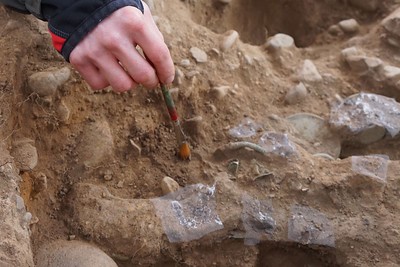
PREV ARTICLE
NEXT ARTICLE
FULL ISSUE
PREV FULL ISSUE
DETECTORISTS AND ARCHAEOLOGISTS TOGETHERThis Popular Science article details how detectorists and archaeologist in Scotland came to work together. It's a lengthy piece - see the complete article online. Here's an excerpt. -Editor Over the past 20 years, Treasure Trove has emerged in Europe as an example of collaboration between heritage authorities and the metal detecting community—two groups historically very much at odds. Responsible recreational searching, advocates argue, helps find objects and sites archaeologists don't have the budget or time to search for.
The relationship between archaeologists and metal detectorists like Stepien is usually fraught. In Scotland and neighboring England and Wales, there's an active community of hardcore hobbyists who share their finds in online chat rooms and meet for occasional metal detecting
While the hobbyists like to think of themselves as treasure hunters or amateur archaeologists, many professionals prefer the term
Even well-meaning amateurs can do harm. Over-eager hobbyists sometimes dunk coins in vinegar to clean off their protective patinas or straighten bent pieces of metal, potentially erasing clues as to how they were once used or why they were discarded. Once they are removed from the find spot and that damage is done, the object's
There's a philosophical element, too. In many countries, ancient artifacts and ruins are considered public heritage.
Until the 1990s, metal detecting occupied a sort of gray area in the UK, allowed on private land but frowned on by authorities and archaeologists. Instead of cracking down on hobbyists, in 1996 Scottish authorities decided to take an
England, Wales, and Northern Ireland initiated a similar effort, called the Portable Antiquities Scheme, in 1997. Over the last five years, a handful of other European countries—including Finland, the Netherlands, and Denmark—have moved in the same direction. Ideally, metal detecting can be a way to enlist members of the public in data-gathering. Individual coins, for example, might not have much value on their own, especially when they're plucked from farm fields torn up by decades of intensive plowing. But with a database of coins discovered by detectorists, a canny researcher might be able to understand the political reach of a past kingdom, or map out the places people were most likely to settle at different periods. Metal detecting has revealed new insights about the Viking colonization of England, for example, by allowing researchers to map coins and metal finds.
To read the complete article, see:
THE BOOK BAZARREWayne Homren, Editor The Numismatic Bibliomania Society is a non-profit organization promoting numismatic literature. See our web site at coinbooks.org. To submit items for publication in The E-Sylum, write to the Editor at this address: whomren@gmail.com To subscribe go to: https://my.binhost.com/lists/listinfo/esylum All Rights Reserved. NBS Home Page Contact the NBS webmaster 
|
